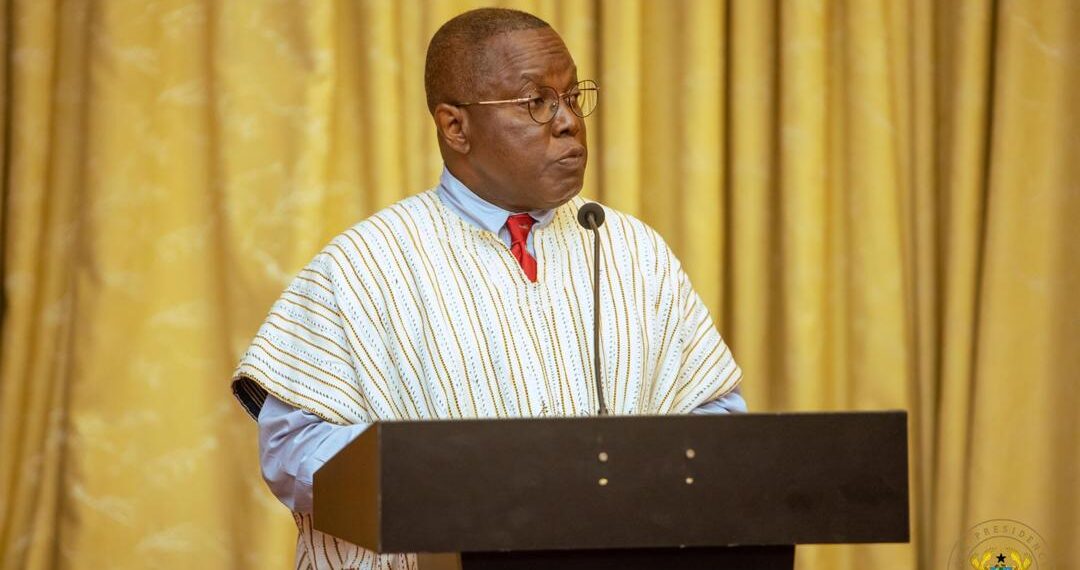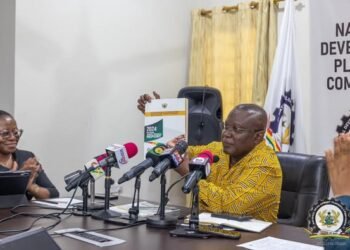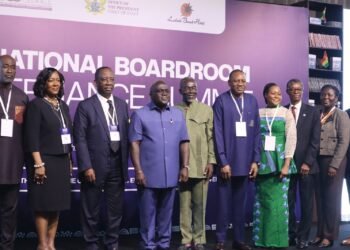The Chairman of the National Development Planning Commission (NDPC), Dr. Nii Moi Thompson, has issued a stern warning about the severe economic and developmental toll of uncompleted projects across the country.
Speaking at the launch of the National Development Planning Commission’s (NDPC) 2024 Annual Progress Report in Accra, he described the situation as “an albatross around our necks” , and called for decisive national action to halt the cycle of waste and inefficiency that has long undermined Ghana’s development efforts.
Dr. Thompson lamented that despite years of research and public discussions, the issue of abandoned and uncompleted projects continues to plague the nation, draining public resources and impeding progress.
“Some of the issues you’ve raised are certainly worrisome. The issue of uncompleted projects remains an albatross around our necks, collectively, and we need to somehow tackle that. We will have to do that. Individually, we have to lead the crusade against that”.
Dr. Nii Moi Thompson
He recalled that a decade ago, during the preparation of Ghana’s Forty-Year National Development Plan, the NDPC identified the proliferation of abandoned projects as one of the most pressing national development concerns.

The Commission, he said, had even partnered with a researcher from one of the leading universities in the world to develop a database that tracked uncompleted projects across the country.
The findings, according to Dr. Thompson, revealed a stark contrast between projects funded by international donors and those financed through domestic resources such as the District Assemblies Common Fund (DACF) or Internally Generated Funds (IGF).
“Projects funded by donors followed certain predictable processes and therefore had a higher likelihood of completion. On the other hand, projects funded from the DACF and IGF tended to be haphazard and sometimes even politically motivated.”
Dr. Nii Moi Thompson
Political Interference
He expressed deep concern that political interference at the local government level has been a major driver of the problem.
During the NDPC’s field consultations, the Commission discovered that some District Chief Executives (DCEs) initiated new projects rather than completing existing ones, often as a strategy to boost their chances of winning parliamentary elections.
“They may win, they may not win, and then the project is abandoned. We had two pretty much the same projects, and then another DCE comes in, and they also want to start a third one because they want to go to parliament.
“And that partly may explain why sometimes you see markets either semi-completed or fully completed in the bush, and the people are in the towns trading on the sidewalks or pavements”.
Dr. Nii Moi Thompson
To address this recurring problem, Dr. Thompson disclosed that the NDPC once recommended introducing a cooling-off period for DCEs who resign to contest parliamentary elections.

“The recommendation at the time was that anyone who resigned as DCE to run for parliament should wait at least two years. That would discourage them from using development projects as stepping stones to parliament.”
Dr. Nii Moi Thompson
He also cited the practice of appointing failed parliamentary aspirants as DCEs as another factor undermining effective project execution, describing it as a politically expedient but developmentally harmful approach.
“There are a lot of issues there. But the bottom line is that all these uncompleted projects represent trapped capital that runs into hundreds of billions of cedis while we are out there looking for $1 million, $500,000 from Turkey and all those places.”
Dr. Nii Moi Thompson
Imprudent Utilization of Scarce Resources
According to him, this situation reflects “imprudent utilization of scarce resources” and underscores the need for a systemic overhaul of how public projects are initiated, funded, and monitored. He described the problem as “endemic” and urged all stakeholders to confront it with urgency.
“Some of the examples you gave, dating back to Ignatius Kutu Acheampong’s time, really struck me. Because, again, 10 years ago, when we were doing the process, we also faced the same resource challenges. It’s an endemic problem that ought to be urgently addressed.”
Dr. Nii Moi Thompson
Recognizing the seriousness of the problem, the new administration led by President John Dramani Mahama has made completion of abandoned legacy projects a national priority.
The government has allocated 20 percent of the District Assemblies Common Fund to addressing the backlog of uncompleted projects, particularly those left behind by the Middle Belt Development Authority, Coastal Development Authority, and Northern Development Authority.
In addition, the Minister of Education has directed the Ghana Education Trust Fund (GETFund) to take inventory of all abandoned projects within the educational sector to facilitate their completion.

The government has also begun allocating resources to key national projects that were left in limbo, including the La General Hospital, the KNUST Teaching Hospital, several Community Day Senior High Schools, as well as critical road and market projects.
While these measures by the new administration are commendable, more decisive steps must be taken to address the root causes of the problem.
The persistent waste of resources on uncompleted projects represents not only poor planning and weak accountability but also a deep governance challenge that requires stronger institutional oversight, transparent project tracking, and political discipline at all levels of government.
Only by addressing these underlying issues can Ghana break free from the costly cycle of abandoned projects and ensure that public investments truly serve the nation’s long-term development goals.
READ ALSO: Ghana Bourse Records Explosive Growth in Trading Activity





















